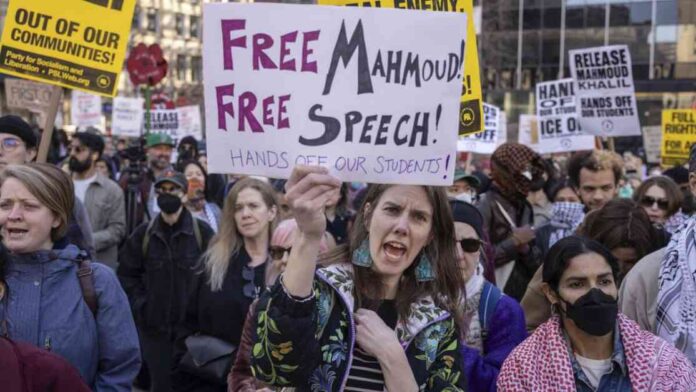The federal government’s recent decision to take action against a Columbia University graduate student, Mahmoud Khalil, by revoking his green card and potentially deporting him due to his involvement in a pro-Palestinian student encampment has sparked a heated debate on the rights and risks faced by non-United States citizens engaging in political activism.
Mahmoud Khalil, a key negotiator representing student protesters at Columbia University during demonstrations over the war in Gaza, was arrested on March 9 by U.S. Immigration and Customs Enforcement agents. This move, executed under a State Department order to revoke Khalil’s student visa despite his green card status, has ignited concerns about the implications of political activism on the immigration status of non-U.S. citizens.
The situation surrounding Khalil’s potential deportation has raised questions about the protection of rights for non-U.S. citizens participating in political activities, particularly in light of an executive order signed by President Trump targeting “Hamas sympathizers on college campuses.” Secretary of State Marco Rubio defended the government’s actions, emphasizing that the issue is not merely about free speech but also about the presence of individuals who may not have the right to be in the United States.
Amidst these developments, experts and advocates shed light on the legal landscape and protections available to non-U.S. citizens engaged in political activism, emphasizing the importance of understanding the nuances of immigration laws and constitutional rights.
### 1st Amendment Protections and Challenges
Immigration advocates and legal experts stress that regardless of immigration status, individuals residing in the United States have the fundamental right under the 1st Amendment to participate in activism and political demonstrations, including protests. Ahilan Arulanantham, co-director of the Center for Immigration Law and Policy at UCLA’s School of Law, highlights the potential violation of the 1st Amendment if immigration status is targeted based on political activities.
While non-U.S. citizens have the right to engage in protests, concerns arise regarding the risk of facing charges that could jeopardize their immigration status, such as vandalism misdemeanors or resisting arrest. Veronica Garcia, a staff attorney with the Immigrant Legal Resource Center, underscores the balance between exercising rights and potential legal implications that may arise from protest-related actions.
### Understanding Immigration Status and Activism
The revocation of a green card solely based on participation in political activism is generally not permissible under immigration laws. However, specific circumstances, such as criminal convictions related to violent offenses or resisting arrest during protests, can potentially impact a green card holder’s deportability, as outlined in the Immigration and Nationality Act.
In cases involving temporary visas, the government retains the authority to revoke student or faculty visas without providing a reason, presenting challenges for individuals attempting to link visa revocation to political activities. DACA recipients also face potential risks if convicted of multiple misdemeanors, while navigating the complex intersection of activism and legal standing within the DACA program.
### Navigating Rights During Protests
Legal experts emphasize the importance of understanding constitutional rights, particularly the 4th Amendment protections afforded to non-U.S. citizens, regardless of their immigration status. Recommendations include carrying appropriate documentation to establish lawful presence and exercising caution in disclosing protest participation to mitigate potential legal consequences.
While participating in peaceful activism is a protected right, the nuances of immigration laws and enforcement underscore the need for individuals to seek legal guidance to navigate the complexities of engaging in protests. Consulting with experienced attorneys can provide clarity on the risks associated with political activism and ensure informed decision-making in safeguarding immigration status.
As the debate continues over the intersection of political activism and immigration status, the case of Mahmoud Khalil serves as a poignant reminder of the ongoing challenges faced by non-U.S. citizens in exercising their rights while navigating the legal landscape of immigration policies and constitutional protections. By fostering a deeper understanding of these issues, individuals can advocate for their rights with greater awareness and preparedness in an evolving socio-political climate.









